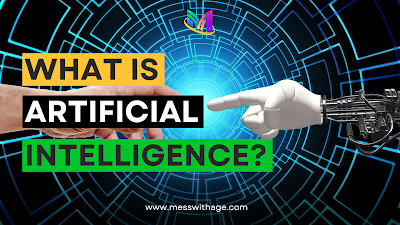What is Artificial Intelligence and how does it work?
Introduction:
Artificial Intelligence, or AI, is a transformative technology that has become an integral part of our daily lives. From virtual assistants to recommendation systems, AI is reshaping the way we interact with and perceive technology.
Historical Overview of AI:
The roots of AI can be traced back to ancient times when the concept of machines mimicking human intelligence first emerged. Nonetheless, it wasn't until the middle of the 20th century that the study of AI truly gained momentum. Significant milestones, such as the development of the first AI programs, marked the beginning of a journey that continues to evolve.
Types of Artificial Intelligence:
AI can be categorized into Narrow AI, designed for specific tasks, General AI, with human-like cognitive abilities, and theoretical Superintelligent AI, surpassing human intelligence. Each type plays a unique role in the AI landscape.
How AI Works: A Deep Dive:
At the heart of AI are machine learning algorithms, neural networks, and Natural Language Processing (NLP). These elements collaborate to empower machines, allowing them to acquire knowledge from data, identify patterns, and render decisions.
Applications of AI in Everyday Life:
The impact of AI is evident in virtual assistants like Siri and Alexa, recommendation systems on streaming platforms, and the ongoing development of autonomous vehicles. These applications enhance user experiences and convenience.
Challenges and Concerns in AI:
While AI brings tremendous benefits, ethical considerations, job displacement, and bias in algorithms pose significant challenges. Striking a balance between progress and responsibility is crucial.
Future Trends in AI:
The journey of AI is far from over. Continued advancements, integration with other technologies like the Internet of Things (IoT), and the exploration of quantum computing are exciting prospects for the future.
AI and Business:
In the business landscape, AI is revolutionizing marketing strategies and customer service. Automation and data-driven decision-making are becoming essential for staying competitive.
Impact of AI on Society:
AI contributes positively to society through innovations in healthcare, education, and various industries. However, concerns about job displacement and ethical implications must be addressed for a harmonious integration.
AI in Healthcare:
The application of AI in healthcare ranges from diagnostic tools to drug discovery, improving accuracy and efficiency in medical processes.
AI in Education:
Education benefits from AI through personalized learning experiences and the automation of administrative tasks, allowing educators to focus on teaching.
The Role of Data in AI:
Quality data is the lifeblood of AI. Ensuring data accuracy and privacy is crucial to maintaining the reliability and trustworthiness of AI systems.
Rise of AI in Creativity:
AI is not limited to logical tasks; it has entered the realm of creativity, producing art, and composing music. The collaboration between humans and AI in creative endeavors is an exciting frontier.
Government Regulations in AI:
As AI evolves, governments worldwide are contemplating regulations to address ethical concerns and ensure responsible development and use of AI technologies.
Conclusion:
In conclusion, Artificial Intelligence has transcended its sci-fi origins to become an indispensable part of our lives. The journey from basic AI to the potential of superintelligent systems is a testament to human innovation. Anticipating future developments and navigating the challenges will shape the ethical and practical landscape of AI.
FAQs
Is AI a threat to job security?
While AI may automate certain tasks, it also creates new opportunities and jobs in emerging fields.
How does AI impact data privacy?
AI relies heavily on data, making privacy concerns a priority. Regulations and responsible practices are crucial to address these issues.
Can AI replace human creativity?
AI complements human creativity but doesn't replace it. The collaboration between AI and humans leads to innovative outcomes.
What are the ethical considerations in AI development?
Ethical concerns include bias in algorithms, transparency in decision-making, and the responsible use of AI in various applications.
What role does AI play in shaping the future of technology?
AI is a driving force in technological advancements, influencing everything from healthcare to business strategies.














No comments:
Post a Comment
Please do not enter any spam link in the comment box